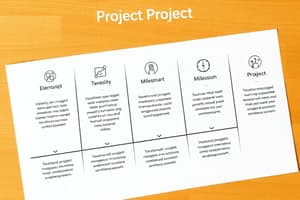Podcast
Questions and Answers
What are project milestones?
What are project milestones?
Key events or checkpoints that indicate the progress of a project.
What is the purpose of project milestones?
What is the purpose of project milestones?
- Assess whether the project is on track (correct)
- Eliminate all risks
- Facilitate communication among team members (correct)
- Increase project costs
What are the components of project milestones?
What are the components of project milestones?
Specific objectives, timeframe, and responsible parties.
Which of the following types of milestones indicate the commencement of a project?
Which of the following types of milestones indicate the commencement of a project?
What is a phase gate milestone?
What is a phase gate milestone?
What is a common challenge faced in project milestones?
What is a common challenge faced in project milestones?
Setting realistic and achievable milestones is considered a best practice.
Setting realistic and achievable milestones is considered a best practice.
What is one benefit of using project milestones?
What is one benefit of using project milestones?
Which of the following are water conservation practices? (Select all that apply)
Which of the following are water conservation practices? (Select all that apply)
What is desalination?
What is desalination?
How does drip irrigation minimize water waste?
How does drip irrigation minimize water waste?
Community engagement is unimportant in water management decisions.
Community engagement is unimportant in water management decisions.
Investing in ______ can help improve water distribution systems.
Investing in ______ can help improve water distribution systems.
Which of the following is an example of sustainable agriculture?
Which of the following is an example of sustainable agriculture?
What is the purpose of smart metering in water management?
What is the purpose of smart metering in water management?
Emergency planning is unnecessary for droughts and water crises.
Emergency planning is unnecessary for droughts and water crises.
Which approach promotes fair distribution of water resources?
Which approach promotes fair distribution of water resources?
Water recycling involves treating wastewater for ______.
Water recycling involves treating wastewater for ______.
Why is community education important in water conservation?
Why is community education important in water conservation?
Flashcards are hidden until you start studying
Study Notes
Project Milestones in Weekly Reports
-
Definition:
- Key events or checkpoints that indicate the progress of a project.
-
Purpose:
- Provide a framework to assess whether the project is on track.
- Facilitate communication among team members and stakeholders.
-
Components of Project Milestones:
- Specific Objectives: Clearly defined targets.
- Timeframe: Deadlines for achieving each milestone.
- Responsible Parties: Individuals or teams assigned to each milestone.
-
Types of Milestones:
- Start Milestones: Indicate the commencement of a project or phase.
- End Milestones: Signify the completion of a project or phase.
- Phase Gate Milestones: Critical decision points where progress is evaluated before moving on.
-
Tracking Milestones:
- Use project management tools to visualize timelines (e.g., Gantt charts).
- Regularly update the status of milestones in weekly reports.
-
Reporting Milestones:
- Include an overview of completed, in-progress, and upcoming milestones.
- Highlight any delays or issues affecting milestone achievement.
- Provide context on the impact of status changes on the overall project timeline.
-
Best Practices:
- Set realistic and achievable milestones.
- Ensure all team members are informed and engaged in the milestone processes.
- Review and adjust milestones as needed based on project evolution.
-
Common Challenges:
- Scope changes leading to altered milestones.
- Resource availability impacting milestone completion.
- Communication lapses causing misunderstandings about milestones.
-
Benefits:
- Enhanced project visibility for stakeholders.
- Improved accountability among team members.
- Better risk management through proactive identification of potential delays.
Project Milestones in Weekly Reports
- Project milestones track project progress
- Milestones act as checkpoints, ensuring the project remains on schedule
- Clear communication about milestones is essential for team members and stakeholders
- Milestones are defined by objectives, deadlines, and assigned responsibility
- Milestone types: start, end, phase gates
- Project management tools can be used to track milestones, such as Gantt charts
- Weekly reports should detail completed, ongoing, and upcoming milestones
- Reports should highlight potential delays or issues impacting milestones
- Effective milestone management requires realistic timelines and communication
- Scope changes, resource limitations, and communication breakdowns can impact milestone completion
- Benefits of proper milestone management include improved visibility, accountability, and risk management
Water Conservation Practices
- Public awareness campaigns encourage water-saving habits, aimed at reducing overall consumption
- Regulations for water usage in agriculture, industry, and households help enforce water-saving measures
- Rainwater harvesting systems collect and reuse rainwater, minimizing reliance on conventional water sources
Technological Innovations
- Desalination removes salt and impurities from seawater, expanding potable water sources
- Water recycling and reuse treat wastewater for irrigation or industrial processes, reducing reliance on fresh water sources
- Smart metering monitors water usage, helping identify leaks and promoting efficiency
Sustainable Agriculture
- Drip irrigation systems precisely deliver water to plant roots, minimizing waste and improving efficiency
- Drought-resistant or water-efficient crops help reduce water requirements for agricultural production
- Soil moisture retention techniques, like organic amendments, enhance soil's ability to hold water, improving irrigation efficiency
Infrastructure Improvements
- Upgraded water distribution systems minimize leaks and losses, ensuring efficient water delivery
- Rainwater catchment areas and reservoirs store rainwater for later use, increasing water availability
- Restoring natural wetlands and watersheds enhances natural water filtration and storage capacity
Policy and Governance
- Water allocation rights ensure fair distribution of water resources among different users
- Incentives motivate businesses and households to invest in water-saving technologies
- International cooperation tackles transboundary water management challenges, fostering collaboration for sustainable water use
Community Engagement
- Local communities involved in water management decisions enhance commitment and ownership
- Education programs in schools raise awareness about water conservation among future generations
- Volunteer programs promote stewardship and responsible management of water resources within local communities
Emergency Planning
- Developing contingency plans for droughts and water crises ensures preparedness for water scarcity
- Stockpiling water supplies and equitable distribution during shortages ensures access to crucial resources
- Regular assessment of local water resources and needs helps monitor water availability and anticipate future needs
Investment in Research
- Funding research into new water-saving technologies and materials promotes innovation and efficiency
- Studying local ecosystems helps optimize water management practices based on specific environmental conditions
- Collaboration with educational institutions fosters research and development of innovative water solutions
Studying That Suits You
Use AI to generate personalized quizzes and flashcards to suit your learning preferences.




